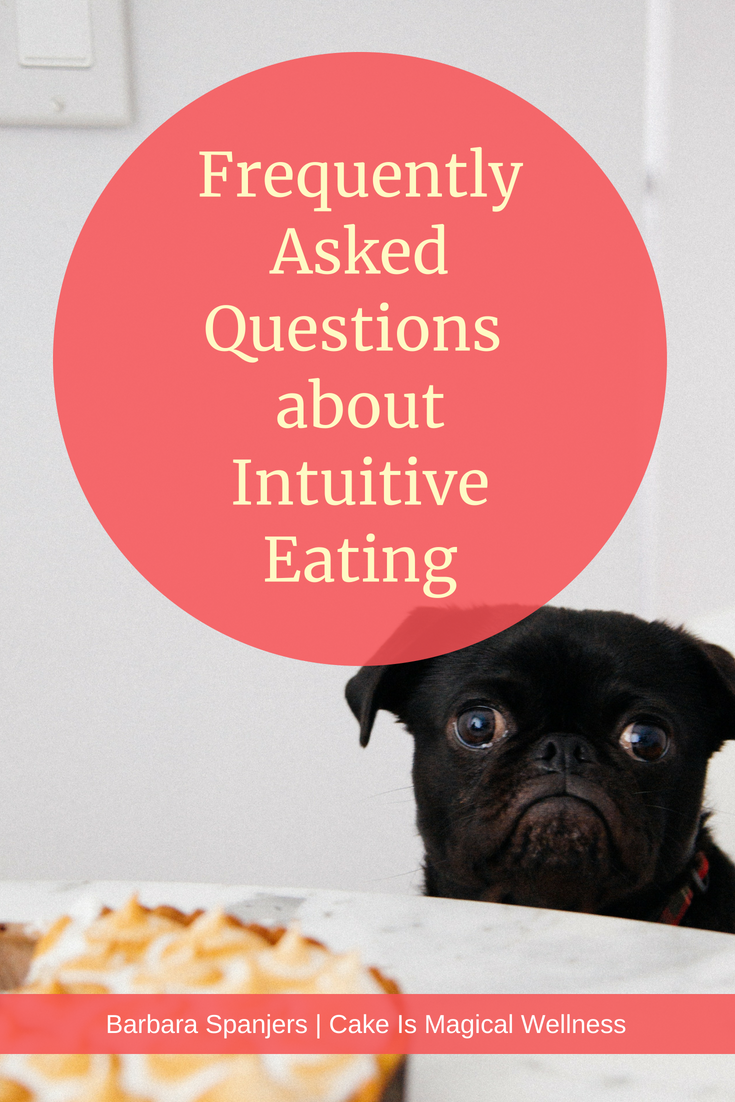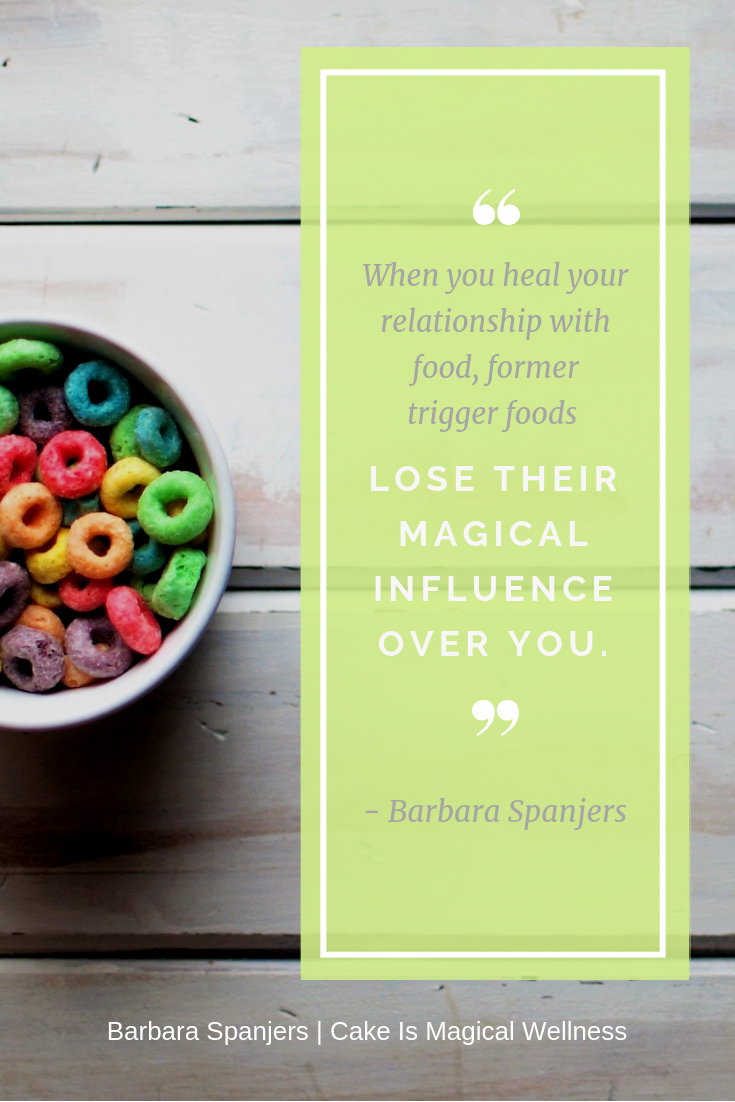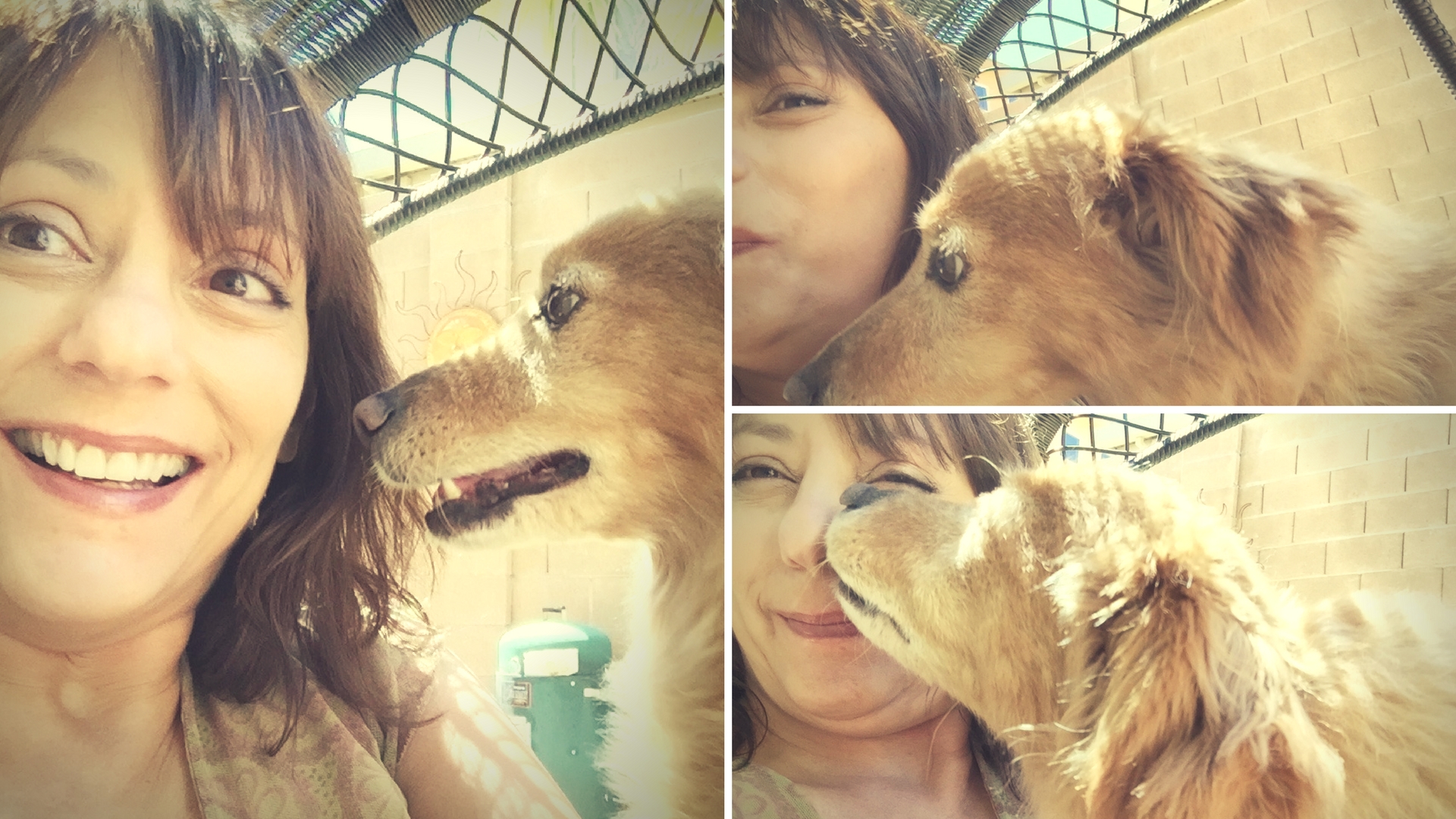Intuitive eating is a powerful antidote to the nonstop diet messages out there. It’s an approach that helps you heal your relationship with food and yourself. As a mental health therapist and wellness coach, I’ve utilized intuitive eating with clients ranging from those who are sick of the dieting roller coaster to those who have an active eating disorder. It’s amazing to see the transformation as people move from food fear to food freedom.
However, the transition to become an intuitive eater is not the easiest thing to do. Particularly when your best friend sells weight loss wraps, your mom is on the latest diet – I mean lifestyle – program, and your employer hosts Biggest Loser competitions.
Given how prevalent diet culture is, it’s no wonder that it’s difficult for most people to comprehend both the philosophy and the power of intuitive eating. Here are some of the most common challenges and frequently asked questions about intuitive eating.

Challenges to Intuitive Eating
Although the principles of intuitive eating are simple in nature, that doesn’t mean they are easy. Essentially, learning intuitive eating is the unlearning of diet mentality. And so the longer you’ve been dieting, the weirder it can feel to stop following external rules about what, when and how much to eat. Be patient! It can take several months, and even years, to feel really grounded in intuitive eating and able to be unfazed in most situations.
Some of the biggest challenges to practicing intuitive eating are:
Being around other people who are diet-focused
Diet-focused people means… practically everyone. When you start becoming aware of the diet-centric language in our culture, you will notice that comments that used to seem innocuous are really part of diet culture. The comment, “Oh! You’re being so good!” when you eat fruit for a snack is a typical example, categorizing food (and the people who are eating) as good or bad.
Finding peers who are not as entrenched in diet culture is fantastic to help you with your intuitive eating process. This is easier said than done, however. At the very least, find body-positive social media accounts to follow. Clean up your social media feeds as it pertains to your real-life friends, too. You don’t have to unfriend people, but you can unfollow them.
Vacation
Going on vacation may generate all-or-nothing thought patterns established earlier while on diets. Even die-hard dieters often abandon their regular behaviors when they travel. It isn’t unusual to put diets “on hold” during vacation, and have a food frenzy.
So when you travel as a newbie intuitive eater, it’s easy to fall into a “get it while I can” mindset, and overeat frequently. This typically leads to guilt and shame.
With intuitive eating, no foods are off-limits, of course. But feeling overly full can keep you from enjoying other vacation activities. Even while traveling, continue to check in with your hunger and fullness levels. A day as an intuitive eater can’t be “blown” by an extra-large meal. If you eat an extra-large meal, just keep monitoring your hunger throughout the rest of the day. This may or may not mean you will have less appetite for the next meal. As long as you keep listening to your body to the best of your ability, things will balance out over time.
Acute illness
Intuitive eating generally encourages you to follow your body’s cues, rather than the clock. However, when you are feeling under the weather, hunger and satiety cues can be very unreliable. During times of sickness, plan to nourish yourself on a regular basis. Your eating patterns may look very different while you are ill, and that’s okay.
Frequently Asked Questions about Intuitive Eating
How can I feel my hunger and fullness signals better? I can’t always tell, especially about getting full.
Two words: practice and patience. Practice identifying your hunger level using the hunger scale, where you place your hunger on a level from one to ten. One is ravenous, five is neutral, and ten is so full you’re physically very uncomfortable. It takes time to identify what each number means for you. A level two for some people might mean shaky. For others, just a very rumbly tummy. For yet others, it could mean a severe headache.
Practicing at all parts of the hunger scale helps overall. It may seem easy to identify when you are hungry, but break it down into more detail. Oftentimes, chronic dieters notice their hunger only when they are overly hungry (level one or two). Waiting this long makes it far more likely that you will eat more than you intended, overshooting the satisfied number on the hunger scale. It’s part of the body’s mechanism to make sure it gets enough food.
Can you identify when your hunger is at a level four? How about level five? Being able to tell the nuances of the hungry side of the hunger scale helps you identify the fullness side. Think about it. If you are not sure whether you are hungry when you start eating, how would you know when to stop?
Patience is crucial with all of intuitive eating, including assessing your hunger levels. If you’re a diet veteran, you’ve got lots of experience ignoring your body’s signals. (Like relying on willpower to ignore your hunger.) Treat yourself with compassion as you make this shift to a non-diet approach.
[click_to_tweet tweet=”If you’re a diet veteran, you’ve got lots of experience ignoring your body’s signals. (Like relying on willpower to ignore your hunger.) Treat yourself with compassion as you make this shift to a non-diet approach.” quote=”If you’re a diet veteran, you’ve got lots of experience ignoring your body’s signals. (Like relying on willpower to ignore your hunger.) Treat yourself with compassion as you make this shift to a non-diet approach.” theme=”style5″]
How do I stop eating when I’m feeling full?
Once you’ve become more adept at identifying your physical cues of hunger and fullness, you may find that you have a hard time ending a meal. Assuming that you were eating in response to physical hunger, and not emotional hunger, an inability to stop eating is usually due to deprivation.
Physical deprivation is just what it sounds like: undernourishing your body. This can be short-term, like when you have an early lunch and are starving for dinner. But it can also be longer-term.
With a history of dieting, disordered eating, or eating disorder, it is common to have shortchanged your body on food. (Indeed, that’s the nature of diets. You take in less energy than your body needs, in an attempt to lose weight.) In that case, you may not have the urge to stop eating, even when getting full. Your body is in protective mode, making sure you’re getting food while the getting’s good. So despite feeling full – even stuffed – you may still want to eat.
Psychological deprivation is another driver of eating past fullness. It usually has to do with having denied yourself “bad” foods like desserts or high-fat entrees. While you are in the earlier days of intuitive eating, all those foods may still have a oversized hold on you. Be patient and nonjudgmental. Eventually, your body and mind will learn that all foods are available on a regular basis. When your body learns to trust that food is provided regularly and plentifully, the need to continue eating will subside.
Another reason for eating past fullness is the association we have with certain foods, and with meals in general. Mealtime is a fabulous time to recharge and connect with friends and family. If you find that you keep eating more often when you are with dining companions, stop and check in with yourself. Do you have an underlying belief that the interpersonal connection will stop when the meal ends? If so, then that explains why you want to prolong the meal.
Or it may be that chatting with others prevents you from paying attention to your hunger signals until you are overly full. It’s okay to pause for a moment during a meal and check in with your hunger. Again, the more you practice this, the more automatic it becomes.
Will intuitive eating help me eat less?
The answer to that is a resounding maybe. Intuitive eating helps you eat an appropriate amount for your body’s needs. That may be less than you currently eat, but it could also be more. Once you tune in to your body’s hunger cues, you may notice that your hunger levels vary from day to day, But usually, it won’t be a wild swing. That stands in contrast to dieting, which so often results in large yo-yoing from being “good” and limiting quantity, to being “bad” and overeating or bingeing. Intuitive eating has been shown to decrease binge eating.
When you heal your relationship with food, former trigger foods lose their magical influence over you. In that respect, you’re less likely to binge on them, or eat large quantities when you’re between diets. But you can also use your new relationship with food to take a portion that is satisfying to you. That portion may be larger than what you were used to from following external rules about portion control.

Will intuitive eating help me lose weight? I know I’m supposed to put weight loss on the back burner, but I still want to lose weight.
This is one of the most common questions, even if it goes unspoken. It is totally understandable to want to lose weight, because this message is so strong in our culture! So there is nothing wrong with you for having this desire. But just like the previous question, the answer to this can only ever be “maybe.”
Intuitive eating is about changing your beliefs, thoughts, and behaviors with regard to eating. You can definitely change beliefs, thoughts, and behaviors – but weight is not a belief, thought, or behavior. Intuitive eating teaches you to be the expert of your own body and experience. Weight change is a potential side effect, but there is no way to predict what will happen. Some people do lose weight, some gain, and some stay the same. There may be a period of time when your body is in the process of finding its natural weight, so you could possibly gain weight and then lose some of it.
Although intuitive eating is associated with lower body mass index (BMI), it is not a weight loss program! (And for the record, BMI is a poor indicator of health.) Anyone selling weight loss as an expected benefit of intuitive eating is misguided. Even if they themselves lost weight once shifting to intuitive eating, it is not appropriate or ethical to promise weight loss to others.
However, with intuitive eating, you can expect to feel more peaceful around all kinds of foods, with far less worry. You will also be less likely to judge yourself as good or bad, depending on what food you ate. Ultimately, feeling better about oneself is what people assume comes from weight loss. With intuitive eating, you’ll see that happiness and confidence are not weight-dependent.
There is an important caveat here, though. Given the intense weight bias in the world, it is easier to live in a thin body. This is not due to the thinner body per se, but how people in society view you. So I in no way want to diminish the fact that yes, losing weight brings privilege. But that is not the same thing as self-esteem that comes from within – which dieting does not help.
[click_to_tweet tweet=”Anyone selling weight loss as an expected benefit of intuitive eating is misguided. Even if they themselves lost weight once shifting to intuitive eating, it is not appropriate or ethical to promise weight loss to others.” quote=”Anyone selling weight loss as an expected benefit of intuitive eating is misguided. Even if they themselves lost weight once shifting to intuitive eating, it is not appropriate or ethical to promise weight loss to others.” theme=”style5″]
I’ve started with intuitive eating, but am worried because I’m eating a lot of junk food. When will I start to crave salads?
Over time, unconditionally allowing yourself to eat formerly forbidden foods takes the power away form those foods. Even {fill in the blank with your favorite food} will stop controlling you. This is called habituation. Because intuitive eating is a very individualized experience, there’s no predictable timeframe on this. Just trust that it will eventually happen.
And when those formerly forbidden foods become less enticing, you’ll naturally desire a variety of foods. You may never crave salads, though. Because maybe it turns out that you just don’t care for salad! Intuitive eating helps you tune in to which foods you really like and dislike. This goes both ways. It turns out that I don’t really care so much for cake icing. Clients have told me that some of the most tempting foods while they were dieting turned out to not really taste all that great, once they gave themselves unconditional permission to eat them.
If you are truly concerned about how much time it is taking to habituate to all foods, it may be that you have not really given yourself permission to eat those foods. There may be some lingering “good food/bad food” mentality that interferes with the process. This question’s reference to “junk food” reiterates that point. Food is not good or bad – it just is.
Beyond that, it is also helpful to introduce your trigger foods more slowly and deliberately. Start with one representative food in different categories. For example, stock your kitchen with one type of cookie; one type of snack chips, and so on. That is a more manageable way to reintroduce foods into your life. Once the first food loses its novelty, try a second kind of cookie. Keep repeating the process.






